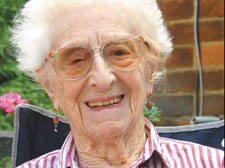|
|
 |
| |
 Rose Hacker Rose Hacker |
When birth control had strings attached
HARDLY a week passes without some shocking news story reminding us of Britain’s scandalously high teenage pregnancy rate, second in the Western world only to the USA.
In my lifetime sexual behaviour and awareness have changed beyond recognition. We were never told the ‘facts of life’. I discovered ‘the truth’ when I found a brown-paper-covered book in my parents’ bedside cupboard and was punished for passing that ‘truth’ on to my younger brother and sister. As a young woman I remember, after a dance at a party, saying to a friend: “I wonder why that boy had a torch in his pocket?” I was a virgin until I got engaged at 24.
When I was planning to get married I hardly dared talk about birth control to my own doctor. I went to a lady doctor along the road who said: “Presumably you’re a virgin? It will be for your husband to break the hymen and you must come back later for birth control.”
This attitude ruined countless honeymoons, made sex unpleasant and difficult for many women and men and subsequently made counselling necessary.
A double standard operated. Many men were experienced, having enjoyed sex with “bad girls”, but were expected to propose marriage to “good girls”, virgins.
Most people were ignorant about birth control before WWII and contraception was difficult to obtain. An avid reader, I needed to know everything. I wanted a Grafenburg ring (the first commercial intrauterine device) but was advised against it, so had to be content with rubber. The man used condoms or the woman used the Marie Stopes Cap or the Dutch Cap. One was a big cap that fitted into the vagina. The other fitted on the neck of the womb and was attached to a string so it could be pulled out. Oh dear, the contortion! You got into the habit of putting it in every night, “in case”.
World War II revolutionised sexual relationships. It was hard to refuse a boy who was off to war, possibly to be killed. Absent husbands rightly worried what their wives at home were up to and with whom, while wives wondered about their husbands’ escapades far away. After the war, problems arose. Returning fathers did not know how to fit into families that had not seen them for four or five years or interact with children who did not know them. Traditional roles were challenged. Previously, society and families were hierarchically structured. Nobody would have dared question a doctor, nurse, teacher, boss or parent.
The Marriage Guidance Council, founded in 1938 with the intention of strengthening marriage, initially addressed some of these concerns. When I joined the Council in 1948, its aims and objectives still included rules that sex was heterosexual, should take place only within marriage and was for reproduction, not pleasure. Masturbation was a “wicked sin”.
I am particularly interested in it being the 150th anniversary of Freud’s birth since we studied Freud and all the major psychiatric theories. We stopped thinking that only psychiatrists were qualified to deal with marriage difficulties and the MGC virtually made the idea of ‘relationships’ acceptable.
Within about ten years, women who came to me switched from saying “I never refuse him” to “Why do I never get orgasms?” There were ever fewer virgin brides.
The Council’s work with young people as preparation for marriage excited me.
We had to invent selection and training procedures for both counselling and the education of young people. Rather than sex education, we invented EPR, Education for Personal Relationships. One of the best things we ever did was to hold summer schools for teachers and others interested in the subject. Alan Ingleby was our first pioneer. His slogan, “Meet the young people where they are!”, is such an important idea I will come back to it.
My first book, in 1956, was called Telling the Teenagers, then just an age group. It was aimed at youth leaders because, at the time, children between 13 and 19 were either young workers or at school and had no money. Many attended youth clubs.
Years later they became a ‘market’, which changed everything. On the advice of a childcare inspector, I wrote a paperback intended for teenagers to read.
The Opposite Sex came out in 1960 and sold a quarter of a million copies. The arrival of the pill in the 1960s was supposed to free women from the tyranny of unwanted pregnancy. For many, sex has become a recreational pastime rather than the consummation of a loving and committed relationship. Acceptability of sexual practices has been transformed.
Contraception and information on sex and birth control are universally available.
From not talking about sex, it sometimes seems that people now talk of little else. So in a future column I will try to understand why, shockingly, 21st century Britain still has Europe’s highest teen-pregnancy rates.
|
| |
|
 |
|